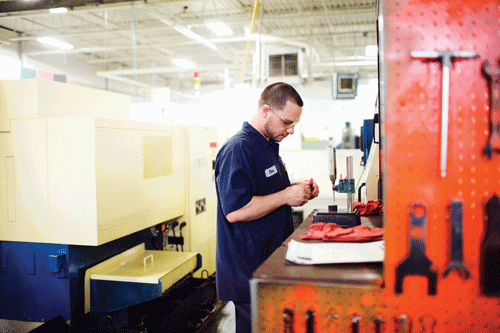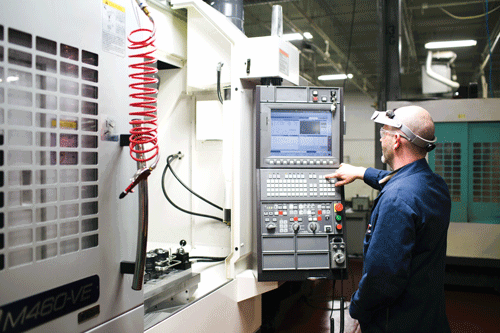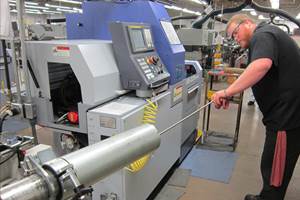Not Labor Day, Process Owner Day
Labor doesn’t add much value. In my experience, it only moved stuff around. The labor jobs went away. Today, I celebrate the process owners that can tear down and set up a multi-spindle cam machine in under 2 hours. They own their process and own their craft.
Labor Day was originally held in New York City on September 5, 1882, to show, “the strength and esprit de corps of the trade and labor organizations,” of the community and to host a festival for the workers and their families.
A lot has changed in the world since 1882, and the role of labor is certainly one of them. My first job at a steel mill in the summer of 1970 was that of a laborer. That’s the job they punched on my timecard each shift. I was hired straight into the “Labor Gang.” I worked 4 p.m.-midnight shifts as I went to college full time, worked full time and enjoyed college night life full time as well.
I didn’t bring much more to my job than my tired, and often hungover, physical strength. There wasn’t a lot of craft in shoveling, but I did learn about having a rigid setup, if I didn’t want to slip on the slippery pellets that we shoveled.
I learned that if I had a D-handle and the shovel got pulled into a moving belt, I could get pulled into the belt and killed or injured. It never happened to me, but I learned all about locking out the equipment I was working around. I suppose that was one aspect of my craft that I mastered. By the time my company recognized my college degree 10 years later in 1980, I was the laboratory supervisor, and my department had no laborers. I had technicians for testing and machine operators for sample prep, but no laborers.
I worked for a cold-finished plant as a plant metallurgist and quality manager from the mid-1980s through the end of the1990s. No laborers there. We had crane men, bench operators, straightener operators, NDT operators and shippers, but no laborers.
Finally, we consolidated a couple of companies into one, but in the cold-finished side of the business, we had no laborers.
Today, as PMPA’s director of industry research and technology, I compile a survey and report on the wages for the member companies of the Precision Machined Products Association. It covers almost 6 percent of the industry’s employment, according to the U.S. Census. I just reviewed our latest report, and we don’t even have a job title for “laborer.”
Process Owners, Not Laborers
The day of laboring for a living is done. In my career, it was gone by the 1980s. In our industry, the last labor jobs left during the 2009 recession. Today, our shops rely on process owners to operate, set up our equipment, produce parts and inspect them to the highest standards. Today, our shops’ process owners are the go-to men and women that we turn to for understanding when making control plans and corrective action plans, as well as matching machine and process capability to the new jobs we quote.
When I walk into our member company shops, I don’t think of labor like the politicians did in the 1880s. I don’t see a need for them to march down the street in a show of strength either. I see esprit de corps every day when I am in the shop and see the handoff between purchasing, planning, operations, quality control, shipping and the customer, just-in-time, zero PPM. Our folks are using, viewing, studying, programming and coding using computerized technology, and often doing so in more than three axes.
I see the pride in our craftsmen and craftswomen when they gage the part, look at the reading, dial an offset into the control, hit start and the next part measures exactly what was required. I share their joy when the parts come back with a green tag and not a red tag. When they look at the part magnified 50 times or 100 times and the geometric form matches the template perfectly, that tiny smile shows they love their craft and their accomplishments with the technology they use.
I see our people adding value by assembling components, packaging them securely and getting the correct information in and out of the computer and onto the shipping documents, labeled, then loaded on the correct truck.
The people of the precision machining industry don’t “labor,” they own processes. They master their processes. They are process experts. They use their talent, insight and craft to add value. So automobiles go and stop. So planes fly and land. So people can be healed and reassembled. So appliances, controls, sensors, computers and everything that is more complex than that shovel with which I started my career can function.
Labor doesn’t add much value. In my experience, it only moved stuff around. The labor jobs went away. Today, I celebrate the process owners that can tear down and set up a multi-spindle cam machine in under 2 hours. They own their process and own their craft. I celebrate the process owners that can look at the part, write the code, and select the tools, coatings, speeds and feeds to make the part to spec right off the machine. They own their process, and they own their craft.
I celebrate the people that program, fi xture and operate the CMMs used to assure the conformance of the most complex parts to specifi cation. They own their process, and they own their craft.
It isn’t about labor today. It’s about having a process, following a process and assuring that it is an effective process. That’s really not up to management. Our job is to provide the tools, materials, supplies and systems needed. But the process is owned by the craftsman. So today, I am celebrating “Process Owner Day.” Process owners are the folks who make my world and lifestyle possible today. The setup man. The woman in quality assurance. The machine repairers. The skilled operators. The engineers, the estimators. They are all process owners.
Happy Process Owners Day to all of you!
By the way, what process do you own?
Related Content
6 Tips for Training on a Swiss-Type Lathe
There are nuances to training a person to effectively operate a Swiss-type lathe. A shop I visited a while back offers some suggestions.
Read MoreRecognizing Signs of a Degrading Workplace Culture
Is your machine shop missing key “culture elements?” Here are ways to identify if your organization is heading in the right or wrong direction in terms of establishing a healthy company culture.
Read MoreThe Value of Aligning Efforts to Promote Manufacturing Careers
Successfully building the next generation of manufacturers requires a team effort between employers, educators and parents. Each of these three groups has a tremendous impact on young people’s career decisions. Without the support of all three, we are unlikely to bridge the skilled labor shortage that threatens the future growth of our industry.
Read MoreCNC Machine Shop Employment Positions to Consider Beyond Machine Operators
Many machine shops have open machine operator positions to fill. But does it make sense for shops to also seek automation engineers, IT managers and assembly personnel?
Read MoreRead Next
A Tooling Workshop Worth a Visit
Marubeni Citizen-Cincom’s tooling and accessory workshop offers a chance to learn more about ancillary devices that can boost machining efficiency and capability.
Read More5 Aspects of PMTS I Appreciate
The three-day edition of the 2025 Precision Machining Technology Show kicks off at the start of April. I’ll be there, and here are some reasons why.
Read MoreDo You Have Single Points of Failure?
Plans need to be in place before a catastrophic event occurs.
Read More













.jpg;maxWidth=300;quality=90)










